Know yourself, your enemy, and control your institutions!
By Ashahed M. Muhammad -Asst. Editor- | Last updated: Apr 20, 2012 - 1:44:25 PMWhat's your opinion on this article?
Farrakhan issues challenge to HBCU students and faculty at historic Nashville, Tenn. church
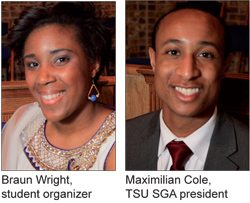
|
The Minister delivered his passionate message containing guidance and encouragement to students from TSU and nearby Fisk University from the pulpit of Jefferson Street Missionary Baptist Church in downtown Nashville.
Students were given priority seating on the inside of the church which was filled to capacity, while seating was set up in an adjacent fellowship hall and outside in the church parking lot to accommodate the overflow crowd. Students cheered as they watched and heard the Minister on large screens.
“What I want you to do for me tonight is I want you to practice critical thinking,” he said. “I want you to listen and judge Farrakhan for yourself.”
At least 75 percent of the crowd inside the church were students, and according to organizers, many students viewed the Minister’s message via live Internet webcast campus wide.
The Minister was glad to see the many students present and wanted to give them guidance to share with others.
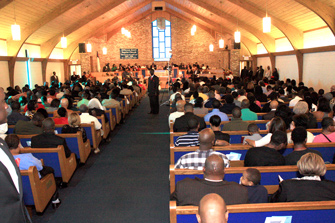
Jefferson Street Missionary Baptist Church in downtown Nashville was filled to capacity. Photos: Erick Muhammad
|
The Minister last spoke at Tennessee State University in the 1990s and over 10,000 came to hear him. “There was no violence, there was no hate, the students were happy, the professors were happy. Something has happened in the intervening years,” he added.
“When I came Tennessee State was a Black college, a member of the historically Black colleges and universities. Today, it doesn’t look the same, and it doesn’t matter, if you really are desirous of making the school better. But if the aim is to destroy it, and then to take the land that these buildings are on so that Tennessee State will no longer exist for future generations, we have a problem with that,” he said.
The Minister said HBCUs—both private and public—had a “very significant role” in the civil rights struggle, specifically related to public accommodation and voting rights for Black people in America. He recalled how young people marched in the streets and were often severely beaten, jailed without cause and attacked by dogs, in order to obtain “equal rights” in America.
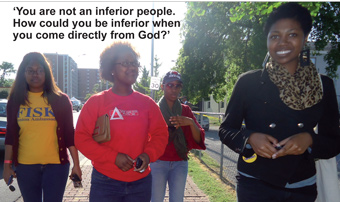
Students from Fisk University make their way to hear Min. Farrakhan in Nashville.
|
He dismissed the charges of those calling him anti-Semitic, and questioned the motivation for such false charges for nearly three decades, because after all, not one Jewish person has been harmed after one of Minister Farrakhan’s speeches, nor have any Jewish people been prevented from going to the school or university of their choice as a result of Minister Farrakhan and the Nation of Islam. No Jewish businesses have ever been the target of a boycott incited by the Minister.
“Could it be that those who call me anti-Semitic are anti-Black? What is the fear that I would come to Tennessee State University at my own expense spending tens of thousands of dollars to talk to you and ask you for nothing but to lend me your ears?” he asked. “What was wrong with me coming up on the campus? Well, I want you to go back after this lecture and tell them Farrakhan wants to come and we’ve invited him again and I’m coming back, no lies, no excuses!”
“I have a message for you that I don’t charge for,” said the Minister. “I want to see you rise and become as great as God would have you to be and I’ve come to give you knowledge to make you rise from a dead level!”
“Black excellence destroys White racism,” said the Minister. “You are not an inferior people. How could you be inferior when you come directly from God?”
Too many times Black people talk about cultural diversity however, they have been stripped of their culture, placing them in a weakened position.
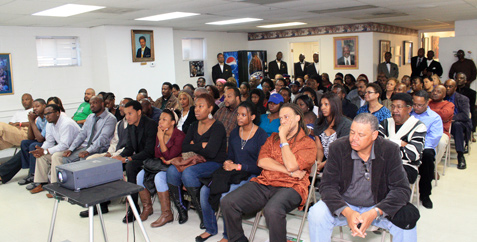
Overflow crowd views address via video feed at Nashville church.
|
The Minister pointed out that Black slaves on loan from plantations were sent to Washington, D.C. to build the Capitol and the White House. Brilliant Black artisans, being held as captive slaves, built mansions throughout the Cotton South in states like Georgia, Alabama, Mississippi, and Tennessee.
Since Black people lack a true understanding of their history—which includes slavery—but also contains great accomplishments pre-dating that time period, continuity linking the generations is lost.
“Before you can reach your full potential, you first have to know what that potential is,” said Min. Farrakhan. “When you know them and know God and know yourself, you are a free Black man and woman!”
“How can the chancellor of the Tennessee Board of Regents guide your development? Do they have your interests at heart?” he asked. “Does the governor of the state of Tennessee have your interest at heart? Oh I’d like to sit down with you Mr. Governor and the Board of Regents because I can prove to you that you are the enemy of the rise of these young students and I’m telling you like Moses and Aaron said to pharaoh, ‘Let My People Go!’ ”
Struggle on campus
Maximillian Cole, a 23-year-old political science major and president of the TSU Student Government Association, described that in late 2011, Samuel X, a student in the ministry class of Muhammad Mosque No. 60 brought forward the idea of Min. Farrakhan speaking to students, it was discussed and there were no objections.
Mr. Cole described dealing with TSU’s office of Student Affairs to work out the details as “arduous.”
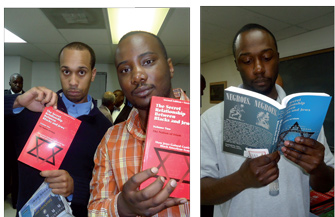
Students purchase and read ‘The Secret Relationship between
Blacks and Jews”. Photos: Ashahed Muhammad
|
President Shields did call a few weeks ago, and said Min. Farrakhan could speak on the campus, however, the Student Affairs Department said there were “numerous facility and scheduling conflicts,” said Mr. Cole.
“It seemed as if there were just so many obstacles in the way to make sure that it wouldn’t be Farrakhan at Tennessee State, it would just be Farrakhan in Nashville,” said Mr. Cole.
Braun Wright, a 21-year-old history and Africana Studies double major is the vice-president of Het-HERU Sorority Inc., told The Final Call the university enacted layers of approval for this event and several professors refused to help sign the needed forms to bring the Minister to campus.
“Before the advisors didn’t have to sign off on our requisitions, but I was sent back and for my requisition, they said the advisor had to sign off,” Ms. Wright said. She said she went to one professor who flat out refused to sign the requisition. “He was very against the Minister coming.”
Ms. Wright said she went to an advisor in the History Department, Dr. Erik Schmeller, to sign off. Since Africana Studies is being phased out, it is now merged with Political Science and falls under the History Department, according to Ms. Wright.
“He didn’t want Farrakhan to come because he is of the Jewish faith and the rumors of Farrakhan being anti-Semitic,” said Ms. Wright. “He did not want to sign off on the requisition.”
Calls to Dr. Schmeller were not returned at Final Call presstime.
Mr. Cole said, “I think it’s the First Amendment right that everybody should come, whoever the students want” whether the administrators agree with the speaker’s views or not. Everybody is entitled to their views, and to be heard, he said.
“My Catholic faith does not keep me away from learning different ideologies—religious or non-religious,” he added.
Both students said they expect retaliation from “higher-ups” such as the Tennessee Board of Regents, however, they will not stop in their attempts to bring Minister Farrakhan back to Tennessee to speak officially on the campus.
“When we go back and speak to our fellow students and speak about what was said and have them actually watch the Minister, I’m pretty sure they are going to be like ‘yes, we want him to come,’ ” said Ms. Braun.
“I’m not going to lie, I didn’t agree with everything that Minister Farrakhan said, but I love Minister Farrakhan. I think his discernments were great and I think that everything he spoke about was great,” said Mr. Cole. “The students wanted him to speak about self-empowerment, self-determination and knowledge. That’s something that you cannot oppose as an administration and that is something that we will continue to fight for, at least while we are students at Tennessee State University and even after that. We will come back and those who need us to fight for them, we can help them out with that kind of advocacy.”
Responsibility and solutions
Blacks know the story of the Jewish holocaust, but don’t know the story of what happened to their ancestors and are not able to deliver the truth about what happened to their children.
“The value of land is critical for independence,” said Min. Farrakhan. Everything that was taught to Black people was designed to make them more serviceable to those who dominated farming and manufacturing, not to make Blacks independent.
“A degree is supposed to confer on you the ability to be a productive member of society, not a beggar to have to ask someone for a job,” said Min. Farrakhan.
The Minister, like a professor, took the students further into the history lesson. He described how during the 12-year period called Reconstruction, Black people built 60 towns in the south. Black people ran the businesses, the political leaders were Black and a high level of business activity resulted in thriving Black economies.
When he asked what majors were present in the audience, only two in the crowd were majoring in agricultural sciences. Ironically, TSU and the school he spoke at two nights prior, Alabama A&M, are both land-grant universities, meaning, they receive federal funding to teach agricultural science and engineering.
“Why are they moving on TSU, they’ve got use for the land that you are not using,” said Min. Farrakhan. “Tennessee State is a part of a college system that is now being taken.”
Enemy doesn’t want colleges to be catalysts for activism
Tennessee State University has 79 percent Black students but 41 percent White teachers. It sits on 186 acres of land. There is also a new interim president, Dr. Portia Holmes Shields, who has been in office for a little over a year. Minister Farrakhan said it appears as if she is on “a destructive mission” but he had some advice for her.
“If you stood up for Tennessee State rather than being the voice of the chancellor, become the voice of the students and the stakeholders, they will respect you more,” Minister Farrakhan told TSU’s president.
There are warriors among the Black professors, and this generation of Black students is no longer willing to be pacified. The HBCUs will have to end dependence on White money to survive, he said.
“A game is being played at the top, so the HBCUs have to unite and dedicate these colleges and universities both private and public to make a people ready to build the kingdom of God,” said Min. Farrakhan. “You are the people of God. He loves you and he wants to give you land so that you can build a future for yourself.”
Related news:
Minister Farrakhan at Alabama A&M Univeristy: 'Is what you are studying contributing to the rise of your people?' (FCN, 04-20-2012)
INSIDE STORIES AND REVIEWS
-
-
About Harriett ... and the Negro Hollywood Road Show
By Rabiah Muhammad, Guest Columnist » Full Story -
Skepticism greets Jay-Z, NFL talk of inspiring change
By Bryan 18X Crawford and Richard B. Muhammad The Final Call Newspaper @TheFinalCall » Full Story -
The painful problem of Black girls and suicide
By Charlene Muhammad -National Correspondent- » Full Story -
Exploitation of Innocence - Report: Perceptions, policies hurting Black girls
By Charlene Muhammad -National Correspondent- » Full Story -
Big Ballin: Big ideas fuel a father’s Big Baller Brand and brash business sense
By Bryan Crawford -Contributing Writer- » Full Story






 Click Here Stay Connected!
Click Here Stay Connected!








